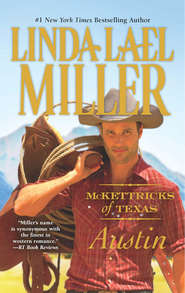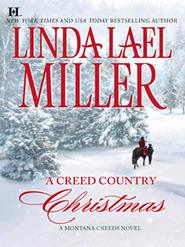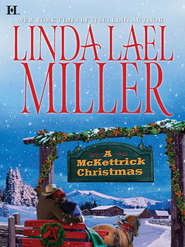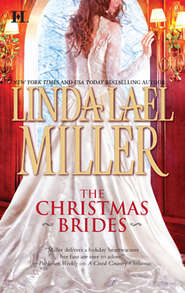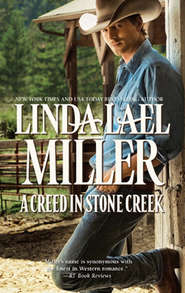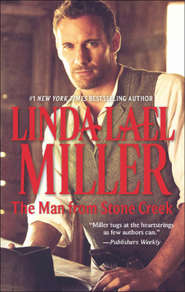По всем вопросам обращайтесь на: info@litportal.ru
(©) 2003-2025.
✖
The McKettrick Legend: Sierra's Homecoming
Автор
Год написания книги
2019
Настройки чтения
Размер шрифта
Высота строк
Поля
Liam smiled, pleased. “This house is so cool,” he said. “I told the Geek—the kids—that it’s haunted. Aunt Allie, too.”
Sierra, in the process of lifting her cup to her mouth, set it down again, shakily. “When did you talk to Allie?” she asked.
“She sent me an email,” he replied, “and I answered.”
“Great,” Sierra said.
“Would my dad really want me to grow up in San Diego?” Liam asked seriously. The idea had, of course, come from Al lie. While Sierra wasn’t without sympathy for the woman, she felt violated. Allie had no business trying to entice Liam behind her back.
“Your dad would want you to grow up with me,” Sierra said firmly, and she knew that was true, for all that Adam had betrayed her.
“Aunt Allie says my cousins would like me,” Liam confided.
Liam’s “cousins” were actually half sisters, but Sierra wasn’t ready to spring that on him, and she hoped Allie wouldn’t do it, either. Although Adam had told Sierra he was divorced when they met, and she’d fallen immediately and helplessly in love with him, she’d learned six months later, when she was carrying his child, that he was still living with his wife when he wasn’t on the road. It had been Allie, earnest, meddling Allie, who traveled to San Miguel, found Sierra and told her the truth.
Sierra would never forget the family photos Allie showed her that day—snap shots of Adam with his arm around his smiling wife, Dee. The two little girls in matching dresses posed with them, their eyes wide with innocence and trust.
“Forget him, kiddo,” Hank had said airily, when Sierra went to him, in tears, with the whole shameful story. “It ain’t gonna fly.”
She’d written Adam immediately, but her letter came back, tattered from forwarding, and no one answered at any of the telephone numbers he’d given her.
She’d given birth to Liam eight weeks later, at home, attended by Hank’s long-time mistress, Magdalena. Three days after that, Hank brought her an American newspaper, tossed it into her lap without a word.
She’d paged through it slowly, possessed of a quiet, escalating dread, and come across the account of Adam Douglas’s death on page four. He’d been shot to death, according to the article, on the out skirts of Caracas, after infiltrating a drug cartel to take pictures for an exposé he’d been writing.
“Mom?” Liam snapped his fingers under Sierra’s nose. “Are you hearing the music again?”
Sierra blinked. Shook her head.
“Do you think my cousins would like me?”
She reached out, her hand trembling only slightly, and ruffled his hair. “I think anybody would like you,” she said. When he was older, she would tell him about Adam’s other family, but it was still too soon. She took his empty cup, carried it to the sink. “Now, go upstairs, brush your teeth again and hit the sack.”
“Aren’t you going to bed?” Liam asked practically.
Sierra sighed. “Yes,” she said, resigned. She didn’t think she’d sleep, but she knew Liam would wonder if she stayed up all night, prowling around the house. “You go ahead. I’m just going to make sure the front door is locked.”
Liam nodded and obeyed without protest.
Sierra considered marking the occasion on the calendar.
She went straight to the front room, and the piano, the moment Liam had gone upstairs. The keyboard cover was down, the bench neatly in place. She switched on a lamp and inspected the smooth, highly polished wood for finger prints. Nothing.
She touched the cover, and her fingers left distinct smudges.
No one had touched the piano that night, unless they’d been wearing gloves.
Frowning, Sierra checked the lock on the front door.
Fastened.
She inspected the windows—all locked—and even the floor. It was snowing hard, and anybody who’d come in out of that storm would have left some trace, no matter how careful they were—a puddle some where, a bit of mud.
Again, there was nothing.
Finally she went upstairs, found a night gown, bathed and got ready for bed. Since Travis had left her bags in the room adjoining Liam’s, she opened the connecting door a crack and crawled between sheets worn smooth by time.
She was asleep in an instant.
1919
Hannah closed the cover over the piano keys, stacked the sheet music neatly and got to her feet. She’d played as softly as she could, pouring her sadness and her yearning into the music, and when she returned to the upstairs corridor, she saw light under Doss’s door.
She paused, wondering what he’d do if she went in, took off her clothes and crawled into bed beside him.
Not that she would, of course, because she’d loved her husband and it wouldn’t be fitting, but there were times when her very soul ached within her, she wanted so badly to be touched and held, and this was one of them.
She swallowed, mortified by her own wanton thoughts.
Doss would send her away angrily.
He’d remind her that she was his brother’s widow—if he ever spoke to her again at all.
For all that, she took a single, silent step toward the door.
“Ma?”
Tobias spoke from behind her. She hadn’t heard him get out of bed, come to the threshold of his room.
Thanking heaven she was still fully dressed, she turned to face him.
“What is it?” she asked gently. “Did you have another bad dream?”
Tobias shook his head. His gaze slipped past Hannah to Doss’s door, then back to her face, solemn and worried. “I wish I had a pa,” he said.
Hannah’s heart seized. She approached, pulled the boy close, and he allowed it. During the day, he would have balked. “So do I,” she replied, bending to kiss the top of his head. “I wish your pa was here. Wish it so much it hurts.”
Tobias pulled back, looked up at her. “But Pa’s dead,” he said. “Maybe you and Doss could get hitched. Then he wouldn’t be my uncle any more, would he? He’d be my pa.”
“Tobias,” Hannah said very softly, praying Doss hadn’t over heard somehow. “That wouldn’t be right.”
“Why not?” Tobias asked.
She crouched, looked up into her son’s face. One day, he’d be handsome and square-jawed, like the rest of the McKettrick men. For now he was still a little boy, his features childishly innocent. “I was your pa’s wife. I’ll love him for the rest of my days.”
“That might be a long time,” Tobias said, with a measure of dubiousness, as well as hope. He dropped his voice to a whisper. “I don’t want Doss to marry somebody else, Ma,” he said. “All the women in Indian Rock are sweet on him, and one of these days he might take a notion to get himself a wife.”
“Tobias,” Hannah reasoned, “you must put this foolishness out of your head. If Doss chooses to take a bride, that’s certainly his right. But it won’t be me he marries. It’s too hard to explain right now, but Doss was your pa’s brother. I couldn’t—”






